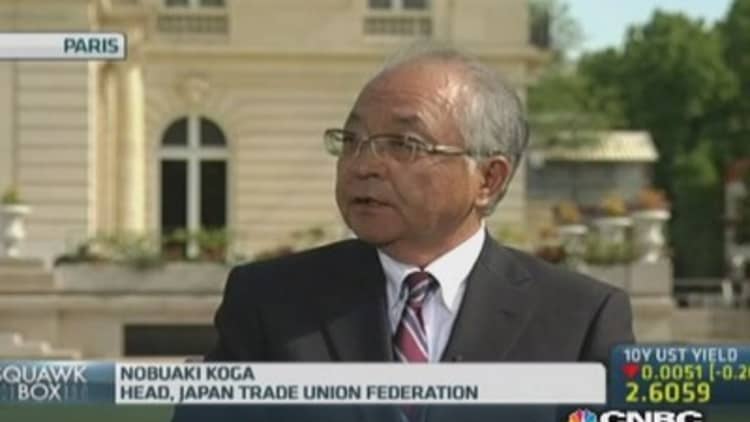
The prospect of labor market deregulation – a key feature of the third "arrow" of Prime Minister Shinzo Abe's economic revival program – is creating anxiety amongst workers in Japan, says Nobuaki Koga, president of the Japanese Trade Union Confederation (Rengo).
"We as workers are very much concerned about how that will be implemented. We have doubts about such a direction in policy and are quite concerned," Koga told CNBC on the sidelines of the annual meeting of the Organisation for Economic Co-operation and Development (OECD) in Paris. Rengo is the nation's biggest umbrella body for labor unions, representing over 6 million working men and women in Japan.
"What we are hearing and seeing are only measures and ideas that will give anxiety and worries to people in terms of the security of their employment. Because of that, we oppose this [labor deregulation]," he said.
Freeing up the rigid labor market is seen as central to the government's structural reform program. However, Abe has so far made little progress with pushing ahead labor reforms due to strong domestic opposition.
Read More
Relaxing stringent job protections is seen as a step necessary to make Japanese companies more competitive and to attract foreign investment.
Abe last week said he remains committed to make working conditions more flexible. "Over the past year we've realized how difficult it has been to do so. But we cannot grow without labor reforms. We are determined to make that happen," Abe said in in a meeting with business leaders in London last Thursday.
Doubts over Abenomics
Koga said while Abenomics has given the country some "bright light", there are several risks associated with the three-pronged strategy of monetary easing, fiscal stimulus and structural reforms.
"We had more than 15 years of deflation and a stagnant economy, so we have now come to a point where we can get out of the that situation. But the key question is: can these Abenomics policies really continue positively going forward?" he said.
Read MoreMarkets show growing unease over Abenomics
He raised concern with the second "arrow" - fiscal stimulus - noting that the government needs to exercise some discipline on this front given the country's high debt levels.
Foreign relations key
The greatest external risk to Japan is deteriorating relations with South Korea and China.
"Tensions between Japan and these countries pose risks. China and Korea, from an economic standpoint, are countries with whom we have indispensable relationships with - we cannot part from them," he said.
Ties between the Seoul and Tokyo have been strained due to anger in South Korea that Japan's leaders have not atoned for their country's wartime aggression, including the use of Koreans as sex slaves, and to territorial disputes over islands in the Sea of Japan.
Read MoreWhy investors should watch out for Japan-China tensions
Meanwhile, Beijing's diplomatic relationship with Tokyo, has suffered due to a territorial row over tiny disputed islands in the East China Sea and perceptions in Beijing that Abe wants to rewrite Japan's wartime history and tone down past apologies.
Analysts say the Japan-China relationship is one of the most important bilateral tie-ups in the world in terms of its impact on economic and regional stability. And with bilateral trade between the two Asian powers estimated at some $300 billion, any deterioration in relations is likely to have significant repercussions for Asia's economy.


